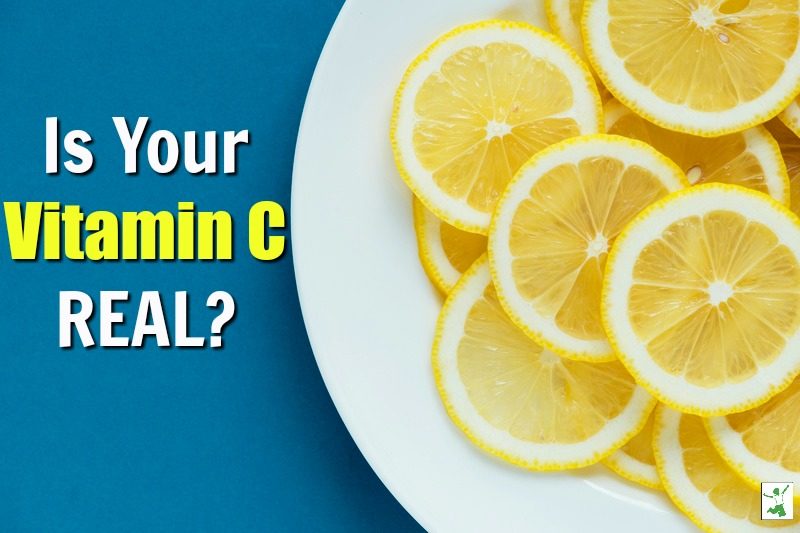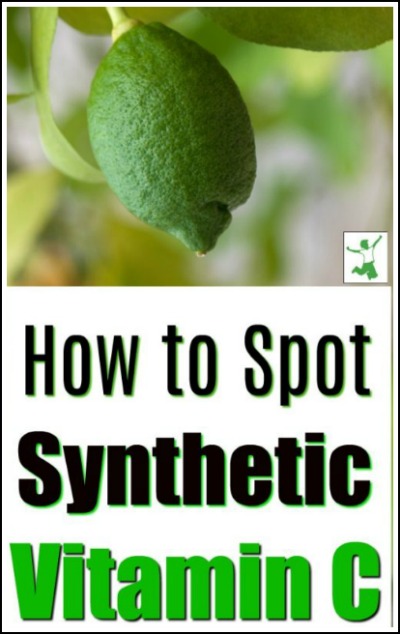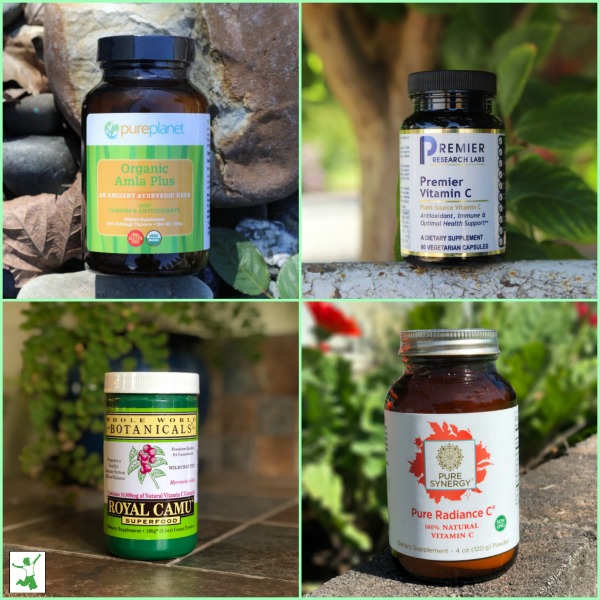Table of Contents[Hide][Show]

Did you know that ascorbic acid is actually synthetic vitamin C? What’s more, it is usually GMO vitamin C, which means it was derived from GMO corn.
If you are learning this for the first time, it can be a rather shocking realization as almost all vitamin C supplements on the market use isolated ascorbic acid separated from a whole food source. The manufacturing process that produces synthetically derived vitamin C leaves all the beneficial co-factors behind!
Even more disturbing, ascorbic acid is frequently marketed as natural vitamin C and added to organic foods as a natural preservative. Truly natural forms of vitamin C and synthetic ascorbic acid seem to be used interchangeably.
How confusing for the consumer!
Nearly all juices and fruit products are loaded up with ascorbic acid, even many organic, healthfood store versions. It seems that if a product is labeled “high in Vitamin C”, consumers buy more of it.
A lot of folks are being fooled by these misleading semantics. There is a growing body of evidence that those consuming high doses of ascorbic acid should have reason to worry.
Three Studies Suggest Caution with High Dose Ascorbic Acid
The journal Wise Traditions cites three studies that give pause about large doses of vitamin C. The first, from the Jun 15, 2001 issue of Science, showed that “synthetic vitamin C may contribute to the formation of genotoxins that can lead to cancer”.
A second study presented to the American Heart Association showed a link between consumption of only 500 mg of vitamin C per day and a greater propensity toward thickening of the arteries (Los Angeles Times, March 3, 2000).
More recently, athletes taking 1000 mg of isolated ascorbic acid per day showed reduced endurance capacity from interference with antioxidant enzymes (American Journal of Clinical Nutrition, Jan 2008).
This information should give pause to anyone who is actively taking synthetic vitamin C supplements such as those Emergen-C packets that are available everywhere, from pharmacies and health food stores to even gas stations!
Supplements like these are NOT boosting immunity and are NOT good for you!
Synthetic vitamins such as ascorbic acid act more like drugs in the body rather than whole food nutrients with all the available co-factors. Taking any synthetic vitamin can cause imbalances in the body and should be avoided.
Another worrisome and popular trend is the recommendation of some alternative health professionals to do a “vitamin C flush” during illness. This therapy (if you can call it that) calls for large doses of ascorbic acid until the onset of diarrhea.
This approach to regaining wellness has never made any sense to me. Now, with more studies indicating the danger of high doses of vitamin C, caution seems well-founded.
Fan of Linus Pauling? Consider This…
If you are a fan of Linus Pauling who popularized the notion of huge doses of Vitamin C for the common cold in the 1970s, consider this. GMO Vitamin C did not exist when Pauling was conducting his studies. GMO derived Vitamin C is what most people are unwittingly taking today!
What’s more, the studies indicating the danger of high doses of vitamin C over long periods of time had not been done yet. They were conducted long after Pauling died in 1994.
What about High Dose, Intravenous Ascorbic Acid?
What about high dose, intravenous ascorbic acid for the very ill? Note that vitamin C for IV use is almost always derived from GMO corn as well as being extremely high dose and synthetic ascorbic acid only.
Under certain circumstances and for the very ill, high dose GMO ascorbic acid therapy can be beneficial. For example, my husband used IV ascorbic acid therapy immediately after each amalgam removal. This prevented any released mercury from getting stored in the tissues. Not doing this risks the development of autoimmune disease.
However, synthetic vitamin C especially when genetically modified shouldn’t be a regular feature in anyone’s diet or supplement regimen.

Whole Food Vitamin C is Naturally Low Dose
The best way to get vitamin C on a daily basis is from whole foods sources. This will provide you this critical nutrient at a low dosage that will do no harm over the long term.
When you get the whole foods version of vitamin C, you don’t need much at all. A truly natural vitamin C supplement with no isolated ascorbic acid is naturally low-dose and yet highly effective.
Don’t forget about the benefits of fresh grassfed milk – a great source of vitamin C. The vitamin C in milk is mostly destroyed by pasteurization, along with many other nutrients. This is why buying fresh and local is so important.
Fresh and lacto-fermented fruits and vegetables (such as traditional sauerkraut) are other excellent sources of the whole vitamin C complex.
Perhaps folks feel the need to take large doses of synthetic vitamin C because all the processed foods they are eating are so devoid of the nutrient in its whole form. Switching to whole foods and dumping those vitamin C supplements in the trash would be a much better approach to boosting immunity!
Ascorbic Acid is Usually from Genetically Modified Corn
What’s worse is that ascorbic acid is not just synthetic. Remember that it is also usually derived from genetically modified corn! More on that GMO vitamin C travesty fooling millions of consumers every single day in the linked article.
Another vitamin scam harming consumers concerns synthetic folate commercially known as folic acid.
The pushing of beta carotene as true vitamin A by food manufacturers and supplement companies is another nutritional falsehood scamming millions of consumers and worse, seriously harming their health.
What to Look for in a True Vitamin C Product
To give you some idea of what to look for in a vitamin C supplement, here are the ingredients of the one I use. Notice that there is no isolated ascorbic acid or other ascorbates and no additives. Just pure food Vitamin C sources. Please note that this is not the only Vitamin C supplement that qualifies as totally pure. There are a few others.
Pure Radiance C ingredients: camu camu berry extract, manioc root, acerola berry extract, amla berry extract, buckwheat sprouts, freeze-dried berry blend, blueberry, raspberry, cranberry, cherry, rose hips fruit, lemon peel, black pepper berry extract.
I also use the Amla C Plus. Here are the ingredients: Organic Amla berry, organic spirulina.
Notice that the words “ascorbic acid” are not listed in either of these products!
Want to know where to find a complete line of whole food Vitamin C supplements from a variety of whole food plant sources?
Click here for several carefully vetted brands to choose from.









So, I happened onto this blog post while looking for something else (not really related to this topic) but the title piqued my interest. Ascorbic acid, in general, IS naturally occurring, so in your main premise here is patently false. There is a form of ascorbic acid that is not naturally occurring called “D-ascorbic acid” but that compound is rarely used in foods because it’s, frankly, it’s more expensive to get and has been found to have substantively less metabolic value as a supplement over the much easier to obtain, and NATURALLY OCCURRING, form L-ascorbic acid (or more commonly ascorbate or, even more commonly: Vitamin C).
So, while I think your underlying point here of avoiding synthetic compounds and instead relying on naturally occurring sources for nutrition is great, I think it’s also important to understand what you’re saying, especially if there’s a scientific basis, before making sensational (and inaccurate) statements like Ascorbic Acid is not Vitamin C” It’s like saying prayer works better than vaccines to prevent disease… but that’s a whole OTHER topic.
I have a degree in natural nutrition, and stumbled across this blog. To offset the immediate hysteria of discontinuing Ascorbic Acid, in favor of “natural” vitamin C, I’d like to add my bit.
DAILY high mega doses of ANY vitamin is never a good idea (synthetic or natural), especially in an otherwise healthy person, as it puts other vitamins and nutrients out of balance in your body. Good health is greatly dependent on keeping the body in balance. That’s why a well-rounded diet of whole foods is recommended for daily PREVENTION of disease and good health.
It is true that eating healthy foods is always the best way to get your vitamins and minerals. However, for THERAPEUTIC and HEALING times of acute illness, infection, or depressed immune system….*temporary* high use of Ascorbic Acid is not only just fine, it is encouraged.
I *finally* figured out that synthetic vitamin C gives me bloating and diarrhea/loose stool. I’ve had it almost every day for months! I finally tested it a few times and yes, OJ/vitamin C supplement/juice purees etc., the next morning I can tell. If I avoid them, everything is perfectly normal! My body is rejecting the stuff.
I get the feeling like I want to go to the bathroom too after I take vitamin c pill. I also get a bad taste in my stomach and mouth even if I take it with food for 4 hours. Now that I changed to natural vitamin c I don’t feel any of these, even if I take it on an empty stomach
My body is sensitive to Vitamin C to the extent that I have an asthma attack
and completely congestion and can not breathe.
If I stay away from acetic acid then my sense of smell comes back
and I don’t have trouble breathing.
It could be that the Vit C you’re using is a derivative of corn and you may have an allergy to corn. I was able to get off my inhaler thanks to high dosages of NutriBiotic Ascorbate Acid in combo with the GAPS diet. But I am only high dosing as I am healing my body of 40+ years of asthma and found nothing else that could replace my inhaler.
What about the tapioca-derived vit c?
Any thoughts on vitamin c as calcium ascorbate? Rainbow Light’s Buffered vitamin c powder contains this version.
Overall, I like this article, the information within and the discussion it has provoked, and agree that wholefood-sourced nutrients and co-factors are always best from a general every-day health perspective outside a clinical setting. But, I become uncomfortable when comparing isolated vitamin C (synthetic or otherwise) to a drug – even to say its effects are ‘drug-like’. I feel we already have a challenge on our hands to prevent Big Pharma controlling the supplement market and lobbying government for classification of such supplements as drugs to become prescription-only and thus dominated by government and industry. Please let’s be very careful how we language this.
What about Ester C? It has calcium ascorbate. Does that metabolize as ascorbic acid?
Much of the ascorbic acid used in US is derived from CORN. Estimates of GM corn in US = 75%. (Personally, I’m intolerant to corn, so one more ingredient to avoid, for me, for sure!)